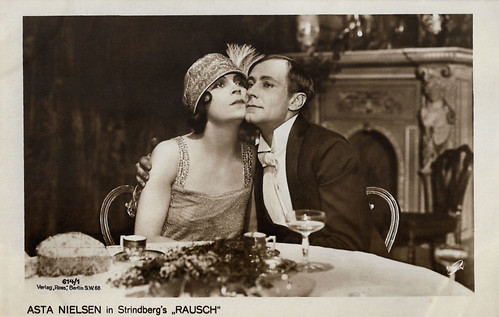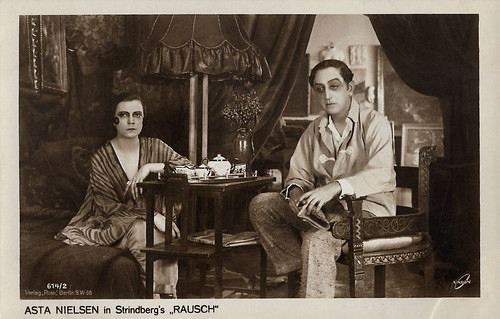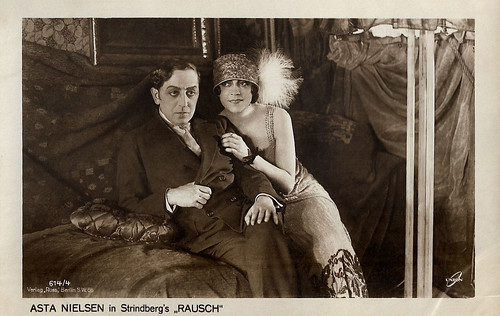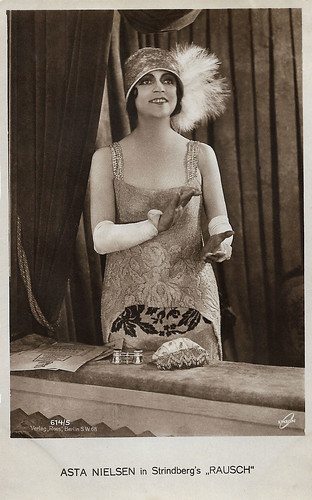Ernst Lubitsch directed legendary film diva Asta Nielsen in the silent drama Rausch/Intoxication (1919). The film was based on the play Brott och brott (Love and Bread) by August Strindberg, and Alfred Abel and Karl Meinhardt were Nielsen's leading men. Lubitsch was loaned out from Union-Film to the smaller Argus-Film for the production. Sadly, the film is now considered as lost.

German postcard by Ross Verlag, no. 614/1. Photo: Union. Publicity still for Rausch/Intoxication (Ernst Lubitsch, 1919) with Asta Nielsen and Alfred Abel.

German postcard by Ross Verlag, no. 614/2. Photo: Union. Publicity still for Rausch/Intoxication (Ernst Lubitsch, 1919) with Asta Nielsen and Karl Meinhardt.
During the First World War, Asta Nielsen met Frida Strindberg, playwright August Strindberg's former wife, in New York City during an American trip. Strindberg wanted to have Rausch filmed by the Fox studio. Asta Nielsen, who was stuck in New York due to the sea blockade, agreed to take over the lead role for financial reasons. However, the project was abandoned before filming had begun, according to German Wikipedia because of the working conditions at Fox.
After the war, theatre director Karl (or Carl) Meinhard(t) resumed the idea of the Strindberg film adaptation, especially since Rausch had a successful run at German theatres. He persuaded Nielsen, who was then living in Copenhagen, to take on the lead role, while he himself took a supporting role in the film. It was Nielsen's first film after the war and also the only one that brought her together with Ernst Lubitsch.
Alfred Abel played the author Gaston, who finally succeeds as a dramatist in Paris at the turn of the 20th Century. He falls in love with Henriette (Asta Nielsen), the wife of his friend Adolph (Karl Meinhardt). In the rush of his of feelings, he leaves his wife Jeanne (Grete Diercks) and their little daughter Marion.
Marion dies by an unfortunate accident and Gaston and Jeanne are suspected of manslaughter. Both accuse each other - Gaston in turn becomes a social outsider and is both professionally and privately increasingly unsuccessful. In the end, it turns out that Marion has died a natural death. Gaston and Jeanne are finally going their separate ways.
During the filming in the Berlin Filmatelier Chausseestraße, it came again and again to differences of opinion between Ernst Lubitsch, scriptwriter Hanns Kräly and Asta Nielsen. Nevertheless, Nielsen described in her 1946 autobiography Die schweigende Muse (The Silent Muse) the shooting as "a happy collaboration with Lubitsch", among other things, because he understood actors and possessed even at that time "excellent ... skills as a director".
Cinematographer of Rausch was Karl Freund. The sets were designed by Rochus Gliese and probably also by Paul Leni. The latter was not officially credited as a set designer but the National Film Archive in London has in its collection designs by Leni for the film. Rausch premiered on 1 August 1919 in the U.T. Kurfürstendamm in Berlin and in Munich.

German postcard by Ross Verlag, no. 614/4. Photo: Union. Publicity still for Rausch/Intoxication (Ernst Lubitsch, 1919) with Asta Nielsen and Karl Meinhardt.

German postcard by Ross Verlag, no. 614/5. Photo: Union. Publicity still for Rausch/Intoxication (Ernst Lubitsch, 1919) with Asta Nielsen.
Sources: Filmportal.de (German), Wikipedia (English and German) and IMDb.

German postcard by Ross Verlag, no. 614/1. Photo: Union. Publicity still for Rausch/Intoxication (Ernst Lubitsch, 1919) with Asta Nielsen and Alfred Abel.

German postcard by Ross Verlag, no. 614/2. Photo: Union. Publicity still for Rausch/Intoxication (Ernst Lubitsch, 1919) with Asta Nielsen and Karl Meinhardt.
Suspected of manslaughter
During the First World War, Asta Nielsen met Frida Strindberg, playwright August Strindberg's former wife, in New York City during an American trip. Strindberg wanted to have Rausch filmed by the Fox studio. Asta Nielsen, who was stuck in New York due to the sea blockade, agreed to take over the lead role for financial reasons. However, the project was abandoned before filming had begun, according to German Wikipedia because of the working conditions at Fox.
After the war, theatre director Karl (or Carl) Meinhard(t) resumed the idea of the Strindberg film adaptation, especially since Rausch had a successful run at German theatres. He persuaded Nielsen, who was then living in Copenhagen, to take on the lead role, while he himself took a supporting role in the film. It was Nielsen's first film after the war and also the only one that brought her together with Ernst Lubitsch.
Alfred Abel played the author Gaston, who finally succeeds as a dramatist in Paris at the turn of the 20th Century. He falls in love with Henriette (Asta Nielsen), the wife of his friend Adolph (Karl Meinhardt). In the rush of his of feelings, he leaves his wife Jeanne (Grete Diercks) and their little daughter Marion.
Marion dies by an unfortunate accident and Gaston and Jeanne are suspected of manslaughter. Both accuse each other - Gaston in turn becomes a social outsider and is both professionally and privately increasingly unsuccessful. In the end, it turns out that Marion has died a natural death. Gaston and Jeanne are finally going their separate ways.
During the filming in the Berlin Filmatelier Chausseestraße, it came again and again to differences of opinion between Ernst Lubitsch, scriptwriter Hanns Kräly and Asta Nielsen. Nevertheless, Nielsen described in her 1946 autobiography Die schweigende Muse (The Silent Muse) the shooting as "a happy collaboration with Lubitsch", among other things, because he understood actors and possessed even at that time "excellent ... skills as a director".
Cinematographer of Rausch was Karl Freund. The sets were designed by Rochus Gliese and probably also by Paul Leni. The latter was not officially credited as a set designer but the National Film Archive in London has in its collection designs by Leni for the film. Rausch premiered on 1 August 1919 in the U.T. Kurfürstendamm in Berlin and in Munich.

German postcard by Ross Verlag, no. 614/4. Photo: Union. Publicity still for Rausch/Intoxication (Ernst Lubitsch, 1919) with Asta Nielsen and Karl Meinhardt.

German postcard by Ross Verlag, no. 614/5. Photo: Union. Publicity still for Rausch/Intoxication (Ernst Lubitsch, 1919) with Asta Nielsen.
Sources: Filmportal.de (German), Wikipedia (English and German) and IMDb.
No comments:
Post a Comment